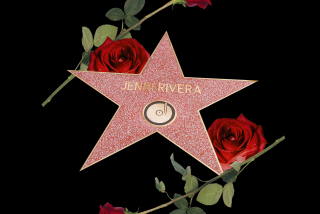Donna Is No-Show as Valens Gets Star
- Share via
Donna couldn’t be found Friday. But her absence failed to bother most of the 200 lovers of rock ‘n’ roll who gathered around noon on Hollywood Boulevard.
They sang her name anyway: “. . . Donna . . . where can you be? Oh Donna, oh Donna . . . Donna . . . . “
In a nostalgic tribute to the man whose hit “Donna” rocketed him to stardom in 1958, fans and relatives of Chicano rock ‘n’ roll legend Ritchie Valens gathered to see him honored with the 1,913th star on the Hollywood Walk of Fame.
It did not matter that the guitar-strumming teen-ager from Pacoima has been dead for 31 years.
“He may be dead, but he’s still alive to me,” said 46-year-old Rudy Ortega of Norwalk. “I can sing the words to all his songs.”
Valens, whose real name was Richard Valenzuela, is considered to be the first Chicano to make it big in rock music. In a span of less than 18 months in 1958 and ‘59, his songs “Donna,” “Come On, Let’s Go,” “That’s My Little Susie” and his rollicking version of “La Bamba,” the traditional Mexican folk song, made him a star.
He was on tour with singer Buddy Holly and Texas disc jockey J. P. (The Big Bopper) Richardson when their small plane crashed in a frozen Iowa cornfield on Feb. 3, 1959, killing them. Valens was only 17 years old.
Since then, the legend of Valens and his love for his girlfriend, Donna, have grown.
Eddie Velez drove all night from Salt Lake City two nights ago to get a glimpse of Donna Ludwig-Coots at Friday’s ceremony--as promised by the event’s organizers. Although she failed to show, he wasn’t disappointed.
“Ritchie knew her,” he said. “I know her through the words. I guess that’s good enough.”
While the demand for Valens’ records has grown, his fans and relatives have been clamoring for greater recognition of his accomplishments. They began a drive to get Valens a star on the Walk of Fame as the ultimate recognition of his success.
Gil Rocha, leader of a rock group that Valens joined before going solo, said the singer was a pioneering influence on the many Latino musicians who came after him. And he was also a role model, Rocha said.
“Ritchie Valens was pure,” Rocha said. “He didn’t do drugs. He did not abuse alcohol or smoke.”
Valens’ friends formed the Ritchie Valens Recognition Committee and raised the $3,500 for installation of the star on Hollywood Boulevard.
The ceremony was laced with cheers and shouts at the mere mention of links to Valens’ past--San Fernando, Pacoima or even the word “Chicano.”
“Listen, I grew up with Ritchie on the radio,” recalled Joe Alvarez of Downey. “He was something special. You had to be from L.A. to really know what he was all about. I knew about the places he grew up.”
Even the very young--who only know Valens’ music from oldies radio stations--professed their love.
“I really love his music,” said 10-year-old Erin Wilhelm. “There’s a beat to it and you can sing along with the song. And you can understand what he’s saying. I really don’t understand the things that they say in today’s music.”
Still, there was the matter of the elusive Donna.
Where was she?
Organizers said Ludwig-Coots had been invited to attend the ceremony. But they could not explain her absence.
“No matter,” said Frank Arteaga, who hitchhiked from Durango, Colo., for the occasion.
“I know the words.”
With that, several people nearby broke again into the familiar chorus: “Donna . . . where can you be? Oh Donna, oh Donna . . . Donna.”
More to Read
The biggest entertainment stories
Get our big stories about Hollywood, film, television, music, arts, culture and more right in your inbox as soon as they publish.
You may occasionally receive promotional content from the Los Angeles Times.










